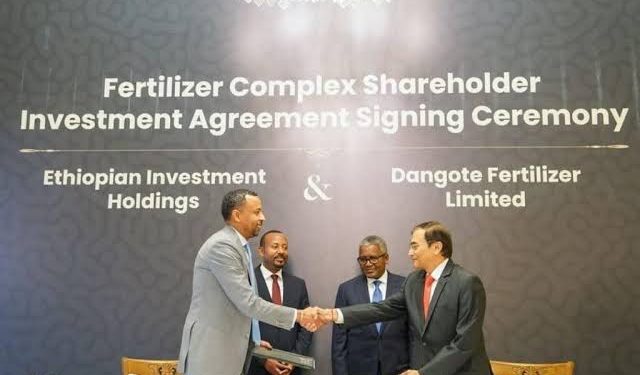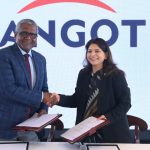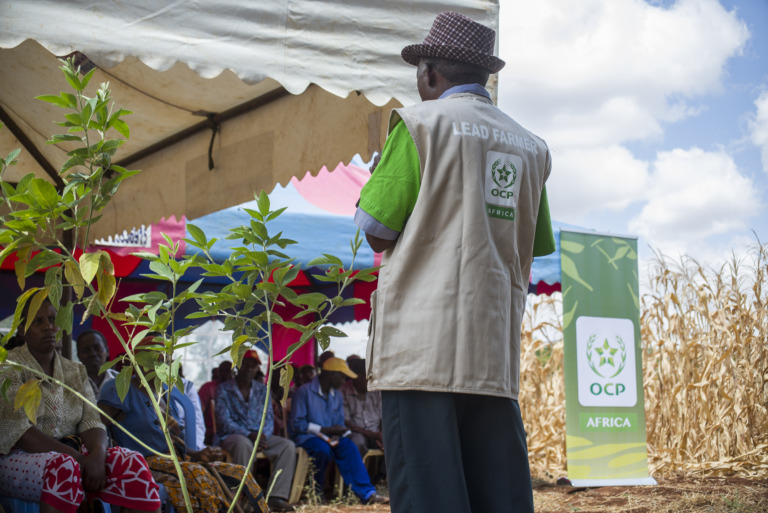The Dangote Group has signed a landmark agreement with Ethiopian Investment Holdings (EIH) to develop, construct, and operate a world-class urea fertiliser production complex in Gode, Ethiopia, in what is set to become one of the largest industrial investments in the country’s history.
Once completed, Ethiopia will become only the second country in Sub-Saharan Africa to host a urea fertiliser plant, with the facility boasting an annual production capacity of three million metric tonnes. The complex will also rank among the top five largest single-site urea plants in the world, underscoring Africa’s growing ambition to become self-reliant in agricultural inputs.
Under the partnership terms, EIH, the government’s strategic investment arm, will hold a 40 per cent equity stake, while Dangote Group will maintain 60 per cent ownership. The $2.5 billion project is expected to be completed within 40 months of commencement and will include the construction of dedicated gas pipelines to transport natural gas from Ethiopia’s Hilal and Calub reserves to the Gode facility.
The plant will be supported by extensive infrastructure, including storage facilities, logistics networks, and export systems designed to serve both Ethiopia’s domestic market and neighbouring countries. The agreement also leaves room for expansions into other ammonia-based fertilisers such as ammonium nitrate, ammonium sulfate, and calcium ammonium nitrate, positioning Ethiopia as a future fertiliser hub in Africa.
Speaking during the signing, the President of Dangote Group said the project represents a turning point for African industrialisation. He stressed that while countries such as Tanzania and Mozambique have long relied on fertiliser imports despite large gas deposits, Ethiopia’s move to partner with an African investor demonstrates that the continent can drive its own development. “The strategic location of Gode, combined with Ethiopia’s abundant natural gas resources, makes this an ideal site for one of the world’s largest fertiliser complexes. This venture will not only transform Ethiopia’s agricultural productivity but also serve as a catalyst for regional food security,” he noted.
The Chief Executive Officer of Ethiopian Investment Holdings described the deal as a milestone in the country’s push for industrial self-sufficiency. He emphasised that the project will reduce fertiliser imports, ensure energy security through the use of local gas reserves, and significantly enhance crop yields by giving Ethiopian farmers access to affordable, high-quality fertilisers.
Beyond food security, the project is expected to create thousands of direct and indirect jobs, particularly in the Somali Regional State where the complex will be located. Employment opportunities will span construction, logistics, operations, and supply chain services, with spillover effects for small businesses and service providers across the region.
Ethiopia’s agricultural sector, which employs over 70 per cent of its population, stands to gain the most. Reliable fertiliser supply at competitive prices will improve farmer incomes, strengthen rural economies, and boost national productivity. At full capacity, the Gode complex will not only meet Ethiopia’s domestic demand but also supply regional markets, placing the country firmly on the global fertiliser map.
With its track record of executing large-scale industrial projects across Africa, Dangote Group brings both expertise and scale to the venture. Combined with EIH’s role as the government’s investment arm, the partnership reflects a strong blend of local ownership and continental vision.
The Gode fertiliser complex is widely seen as a cornerstone project for Ethiopia’s industrial transformation and a signal that Africa can build world-class facilities to power its own agricultural and economic future.










